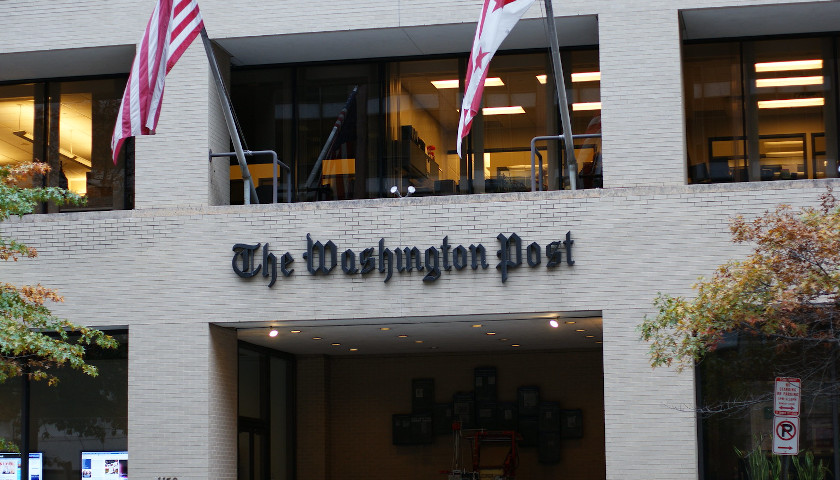by Julie Kelly
In the thick catalog of media players responsible for promoting the phony Russia collusion storyline, the Washington Post occupies a marquee spot. The Post arguably inflicted the most damage on the first few months of Donald Trump’s presidency by pushing the concocted collusion drama even before Inauguration Day.
The Post first published illegally leaked classified information about former National Security Advisor Michael Flynn in early 2017; articles detailing Flynn’s intercepted conversations with the Russian ambassador led to Flynn’s ouster in February 2017.
In April 2017, the Post first revealed the foreign intelligence surveillance warrant on Trump campaign volunteer Carter Page. Several unnamed government officials leaked the explosive news that a former Trump campaign advisor was under government surveillance for his suspected ties to the Kremlin. The purpose of the report was to legitimize the rapidly unfolding narrative that the Trump campaign had colluded with the Russians to hijack the 2016 election.
Since then, thousands of articles, columns, and editorials bolstering the hoax have dominated the paper’s website. In fact, Post reporters and editors met with dossier author Christopher Steele and Fusion GPS co-founder Glenn Simpson months before Election Day as they attempted to plant damaging stories about Team Trump’s canoodling with Russians.
After Steele’s name became public in early 2017, the Post routinely portrayed Steele as a trustworthy “former British intelligence officer” just trying to protect Americans from the Putin puppet running for president.
“While Trump has derided the dossier as ‘fake news’ compiled by his political opponents, the FBI’s arrangement with Steele shows that the bureau considered him credible and found his information, while unproved, to be worthy of further investigation,” Post reporters Tom Hamburger and Rosalind Helderman assured readers in February 2017.
(According to Fusion’s new book, Simpson met with Hamburger, a friend and former colleague, in Philadelphia during the July 2016 Democratic National Convention to discuss Steele’s dossier, including the preposterous “golden showers” accusation. “Hamburger reacted with shock,” the Fusion authors wrote. Simpson and Hamburger met again in September 2016 when Fusion organized its pre-election media blitz between reporters and Steele.)
Motes and Beams
The Post, like the rest of the legacy media attempting to bury its collective complicity in perpetrating this massive fraud on the American people, has refused to own up to its animating role in the scheme. So, it’s a little rich that the same paper now is calling out other reporters and news organizations for hyping the dossier.
But considering no other outlet has performed an autopsy on the collusion corpse, the Post’s critique of selected coverage of the most famous dossier in American political history is a welcome condemnation, if late and lacking in self-reflection.
Erik Wemple, the paper’s media critic, just posted a seven-part series analyzing “how the media handled the Steele dossier.” In his first installment, Wemple takes McClatchy to task for its coverage of an alleged meeting between Trump lawyer Michael Cohen and Kremlin stooges in Prague during the summer of 2016. The trip, cited in the dossier, has been denied by Cohen and refuted by Special Counsel Robert Mueller and the Justice Department’s inspector general.
McClatchy, which owns several newspapers across the country, refuses to retract its Cohen-Prague coverage. In December 2018, McClatchy published an article claiming signals from Cohen’s cell phone were detected in Prague around the same time of the alleged meeting.
“A mobile phone traced to . . . Michael Cohen briefly sent signals ricocheting off cell towers in the Prague area in late summer 2016, at the height of the presidential campaign, leaving an electronic record to support claims that Cohen met secretly there with Russian officials,” the paper reported.
But when Wemple pressed McClatchy’s editors, they stood by their now-debunked stories. “It is important to emphasize that our stories cited evidence—not proof—that Michael Cohen may have made a secret trip to Prague in the late summer of 2016,” they told Wemple.
It’s worth noting that U.S. Representative Devin Nunes (R-Calif.) is suing McClatchy for defamation for aiding a Fusion-sourced smear campaign against Nunes launched shortly after the California congressman began uncovering the roots of the collusion hoax. McClatchy owns the Fresno Bee, which is unrelenting in its negative coverage of their hometown representative.
“There Wasn’t Enough Certainty”
Wemple rubs a bit of cover for his colleagues at the New York Times, the Post’s collusion media-partner-in-crime. After offering little to no scrutiny of the dossier until the release of the Mueller report, the Times suddenly discovered the dossier, its authors, and its benefactors might not have been the most trustworthy sources after all.
Scott Shane, a Times reporter on the collusion beat, told Wemple that the paper once considered posting an extended annotation of the dossier to compare reality with fiction. “We just found that there wasn’t enough certainty about the facts to really make that possible,” Shane told Wemple.
Or, in other words, they knew the dossier was loaded with garbage but didn’t want to expose its illegitimacy because it would have helped Trump and discredited the Mueller probe.
Adam Goldman, another collusion mouthpiece at the Times, told Wemple he tried to chase down the golden showers accusation in the dossier. In an interview, Goldman defended the FBI’s investigation into the Trump campaign and rejected the use of the word “spy” but does express minor disgust at how the FISA process was mishandled.
Wemple criticizes CNN for hiring former FBI deputy director Andrew McCabe as an on-air contributor; Lawfare, a site populated with Trump-hating collusion propagandists, also earns a much-deserved spanking. (Lawfare material and contributors were routine sources for collusion fodder.)
Wemple blasts collusion hoaxsters who still defend the dossier under the guise its allegations haven’t been refuted with evidence to the contrary.
“The absence of disproof is not proof,” Wemple writes. “The Steele dossier skated on this logical equivocation for years. Journalists who recite the ‘not disproven’ talking point might consider that they work in a profession that requires pairing new and explosive claims with the evidence to support them.”
Maddow is Captain of Collusion Cheerleaders
But Wemple aims his harshest remarks at MSNBC host Rachel Maddow. Citing a damning list of dossier-boosting comments and interviews dating back to January 2017, Wemple accurately portrays Maddow as one of the most dishonest and hysterical peddlers of dossier nonsense.
“When small bits of news arose in favor of the dossier, the franchise MSNBC host pumped air into them,” Wemple observes. “At least some of her many fans surely came away from her broadcasts thinking the dossier was a serious piece of investigative research, not the flimflam, quick-twitch game of telephone outlined in the Horowitz report. She seemed to be rooting for the document.”
Wemple posted part of an interview between Maddow and Michael Isikoff, the Yahoo News reporter who authored the first article on the FBI’s interest in Russian collusion; Isikoff pressed Maddow about her nonstop cheerleading for the dossier. Maddow rejected Isikoff’s claim that she had given the dossier “a lot of credence” on her nightly program.
“I feel like you’re arguing about impressions of me, rather than actually basing this on something you’ve seen or heard me do,” Maddow shot back. She refused to give Wemple a comment for his story.
Wemple, however, overlooks one outlet that also attempted to validate the Steele dossier: His own.
Several Washington Post columnists—including Jennifer Rubin, Max Boot, Glenn Kessler, and Philip Bump, to name a few—acted as dossier cheerleaders in a manner no more egregious than Maddow or the writers at Lawfare.
Wemple can fume about CNN hiring McCabe but it’s beyond hypocritical coming from a paper that just hired former FBI Director James Comey, the original signer of the dossier-laden FISA application on Page, as a regular columnist. In an astonishing post-Horowitz report tirade, Comey demanded an apology for being unfairly treated by the president and his supporters.
Further, the Post heavily criticized the February 2018 release of the Nunes memo, which detailed how the bogus dossier provided the bulk of the evidence in the FISA application on Page. “The Nunes memo is out. It’s a joke and a sham,” blared the headline of one of the Post’s many anti-Nunes columns.
Still Wemple’s series is a compelling if incomplete account of some of the worst purveyors of dossier boosterism. And in a news industry infested with bad actors who refuse to accept any sort of responsibility for perpetrating the biggest scam in political history, at least that’s something.
– – –
Julie Kelly is a political commentator and senior contributor to American Greatness. Her past work can be found at The Federalist and National Review. She also has been featured in the Wall Street Journal, The Hill, Chicago Tribune, Forbes, and Genetic Literacy Project. After college graduation, she served as a policy and communications consultant for several Republican candidates and elected officials in suburban Chicago. She also volunteered for her local GOP organization. After staying home for more than 10 years to raise her two daughters, Julie began teaching cooking classes out of her home. She then started writing about food policy, agriculture, and biotechnology, as well as climate change and other scientific issues. She graduated from Eastern Illinois University in 1990 with a degree in communications and minor degrees in political science and journalism. Julie lives in suburban Chicago with her husband, two daughters, and (unfortunately) three dogs.
“Washington Post Building” by Dion Hinchcliffe. CC BY-SA 2.0.




